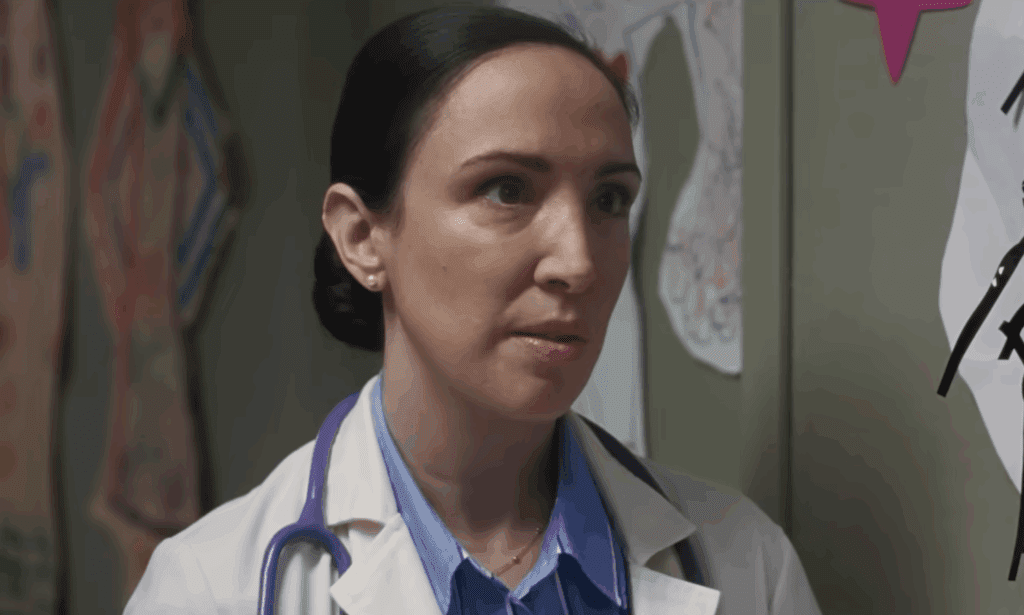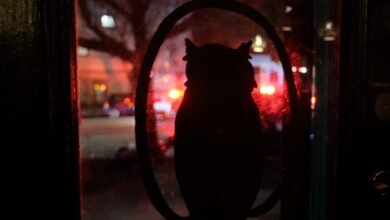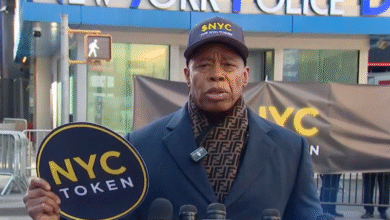Mary Bronstein on The “Existential Terror” of ‘If I Had Legs I’d Kick You’


Mary Bronstein waits to show us the daughter in If I Had Legs I’d Kick You. The child is a haunting abstraction, utilized not unlike the shark in Jaws—a top of a head, wisps of hair, an elbow, a shoe, an urgent voice off-screen demanding attention and consideration. It’s one of the writer and director’s brilliant gambits among many in her intensely visceral new film, because it doesn’t allow the audience to latch onto an adorable child. Instead, the frame is filled by disgusting, greasy takeout and candy, flat and pitiless faces, or faces animated with confusion and terror. We hear a cacophony of irritating distractions: The incessant beeping of medical equipment, the impatient honking of car horns, screeching hamsters from hell, and the drip, drip of viscous liquids through alien holes in the ceiling. We experience parenthood as Rose Byrne’s Linda, a perpetually defeated, tired, pale, and frequently wine-drunk child psychologist and mother in Montauk does through a challenging moment in her life, or as many worn thin, exhausted, and glazed working parents occasionally will: Taking our kids for granted, letting their dependence on us induce anxiety and stress, or, as literalized in the film, not really seeing them.
“What I’m very interested in, as a filmmaker…is figuring out how to communicate feelings in a very urgent and immediate way,” Bronstein says over Zoom from the Chelsea apartment she shares with her husband Ronald Bronstein, a filmmaker and longtime Safdie Brothers collaborator. It is work both she and her husband have dedicated their careers to. Mary met Ronald while working on Frownland, his 2007 directorial debut, and only film to date. She then directed and starred in Yeast in 2008, which Ronald edited. It memorably features a rock fight in the middle of a river—with Bronstein and co-star Greta Gerwig on one side and two guys they happen upon in a stream on the other, played by a young Benny and Josh Safdie (who also served as a camera operator for the film). Both films are abrasive micro-budget indies marked by narrative unpleasantness, largely arcless character studies about off-putting people the world of the film is put off by. These films also serve as an early building block in the Bronstein/Safdie camp’s evolving house style, both in their documentary work and narrative features, sharing its spirit of uncompromising “story” telling, and creating an air of unpredictability that captures the frustration of reality.
Bronstein’s new film (available on VOD today) is next in line, with its expansion of what this strain of movie can be about and who can be at the center of it. Linda is of a piece with Howard Ratner, at times equally self-destructive and grotesque (an admirable feat of writing and directing when Rose Byrne is at the center of your film), if not more so. She might even be more grating, her consequences more anxiety-inducing. Whereas Howie is only fucking his life up with a succession of loser parlays, Linda has a child in tow, relying on her competence and sanity.
I spoke to Benny Safdie recently, who said, in his painstaking reconstruction of what was both on and off screen in his adaptation of John Hyams’ 2002 documentary The Smashing Machine: The Life and Times of Extreme Fighter Mark Kerr, he was similarly inspired to reconstruct a feeling, to bring the audience into the exact sensation of what it felt like to be Kerr during the pivotal, turbulent moment in his life the film covers. I thought it was notable that Bronstein expressed the same desire with her film, albeit one that delivers a flavor of parental panic in the complete opposite way—heightened, absurd, and terrifying, rather than reaching for documentary style.
“I haven’t seen [it], so I can’t speak to that,” Mary said of Benny’s solo effort and her place alongside her husband and the Safdies as a filmmaker (Josh is a producer on If I Had Legs I’d Kick You). “I don’t feel part of a group of anything, although I know I’m certainly intimately close with these filmmakers that you’re describing. Benny’s movie I haven’t seen, but it’s quite different, because it’s a shot-by-shot remake of a documentary that already exists, [the initial documentary] I did see, and that…gave me feelings.” But her film uses many of the hallmarks of recent Safdie films, particularly Good Times, Uncut Gems, and Marty Supreme, all caustic, character-driven stories that function like darkly funny thrill rides, with a verve and velocity that make them as hard to classify as they can be to sit through (though Bronstein does an impressive job categorizing the genre when she refers to her film not as horror, but as “existential terror”).
If I Had Legs I’d Kick You plays with surreality and cinematic language that borders on supernatural horror. To execute her vision of motherhood in crisis, Bronstein uses perspective, sudden violence, and, crucially, sound design, with Felipe Messeder stepping in to replicate the incredible work longtime Coen Brothers sound designer Skip Lievsay has done with the Safdies on Uncut Gems and now Marty Supreme, continually keeping the audience off balance and raising their blood pressure. “[Felipe Messeder and re-recording mixer Ruy Garcia] are geniuses. There’s no score in this movie. The score is the soundscape. From scratch, they created this,” Bronstein says, singing the praises of her collaborators. “I do it a lot in this movie using nonverbal visuals. And I do it a lot in this movie with the way that the dialogue is not written or delivered the way that real people talk. It is a heightened version in all aspects. I’m very disinterested in realism or verite. And I don’t even think that Yeast is that. Yeast, if you go back and look at it, the performances are all very heightened.”

Courtesy of A24
Bronstein, however, is quick to credit what she feels is the film’s main inspiration. “I’m in the tradition of experimental filmmakers, definitely the school of David Lynch.” More so than any “elevated” horror film of the last decade or two (I threw out The Babadook and Hereditary as films I was reminded of), Bronstein said it was the late great Lynch’s brilliant debut that was top of mind over the eight-plus years she spent writing and developing her film. “Eraserhead is an existential terror film about a very unique kind of terror, that only men can experience with having a baby, which is that they can decide to leave. His name is ‘Eraserhead’ because he can erase the idea of having a baby. A lot of people misunderstand that. They think it’s because of his hair. It’s not,” she theorizes. “I call that the brother movie to my movie in a lot of ways. I was very inspired by that movie with my sound design, what David Lynch does with sound in that movie. But I also think it’s a movie about a parental/existential crisis. [Eraserhead is] terror, and horror in a way that’s closest to my movie. Because it’s not about an external horror, it’s about an internal terror.”
Linda does not have the luxury of walking away in If I Had Legs I’d Kick You. Her husband does, and had, on the eight-week job the film opens in the middle of. In his absence, she has to contend with an insecurity very much in conversation with Eraserhead. She has mom imposter syndrome, feelings of inadequacy that stem from a person convincing themselves they’re doing a job they’re not qualified or suitable to do. Normally, when we talk about imposter syndrome, it’s in reference to people who simply lack confidence and need to embrace a role they’re not sure they’re up for. The uneasy question the film asks is, “What if they’re actually not up for it?” This is very much by design. “I want people to leave with something to discuss. If you see a movie, and then you go to dinner, and you’re talking about something else, and you go to bed, and you haven’t thought about the movie. That, to me, is a waste of an opportunity,” Bronstein says.
At the end of the film, Linda commits an unforgivable act, then runs to the nearby ocean in what appears to be an attempted suicide, and she can’t even get that right—waves toss her to shore over and over again. She comes to, and finally, appropriately, on the beach, we see Jaws, the face of her daughter, played by Delaney Quinn. Linda whispers, “I’ll be better, I promise, I’ll be better,” before a title card dedicating the film to Bronstein’s daughter, Faye, graces the screen, and the film ends abruptly. If you’re in the process of raising a child, or have a pulse, it’s hard not to feel something.
The post Mary Bronstein on The “Existential Terror” of ‘If I Had Legs I’d Kick You’ appeared first on BKMAG.




